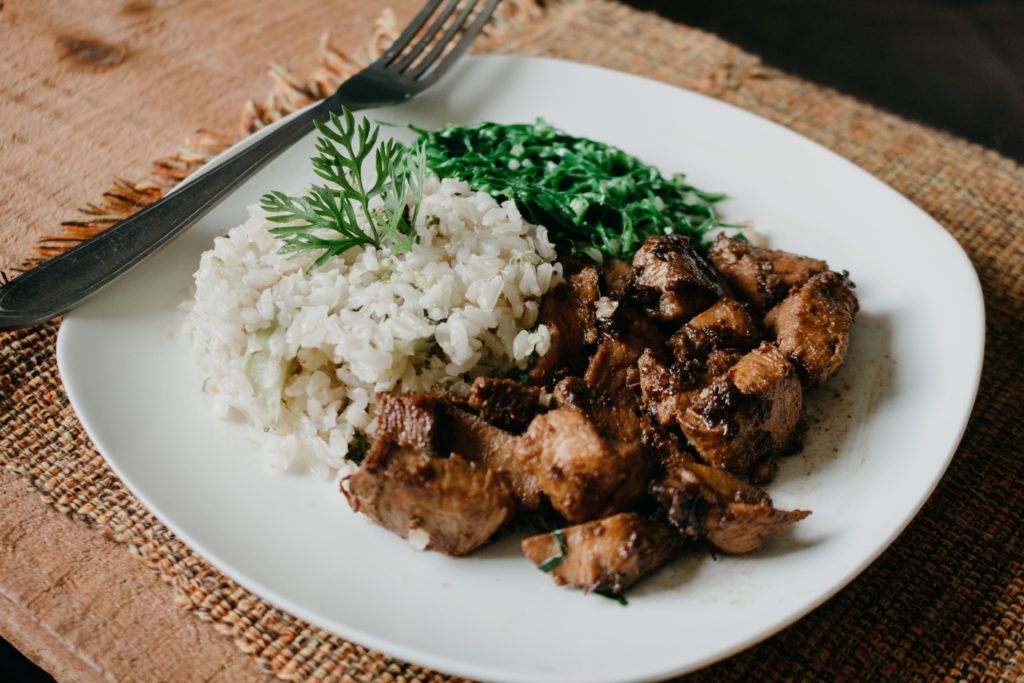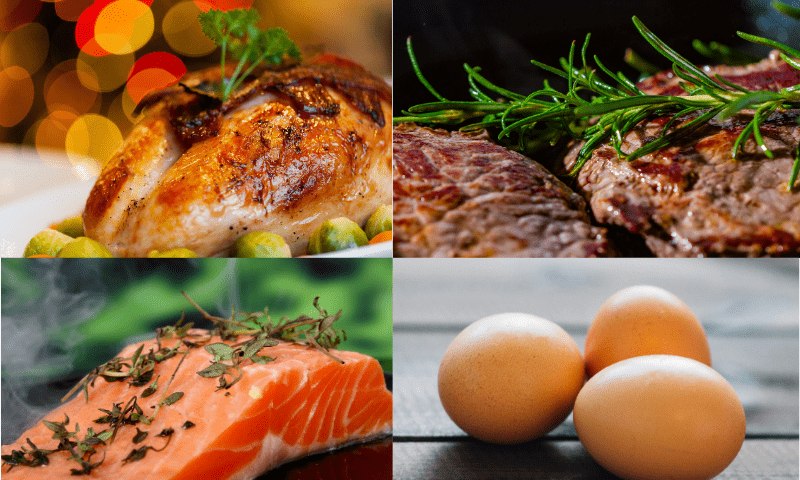Pre-Workout Nutrition for Building Muscle and Improving Performance

Table of Contents
- Carbohydrates
- Protein
- Fats
- When Should I Eat Before Lifting?
- How Much Should I Eat Before Lifting?
- What Should I Eat Before Lifting?
- What to Limit or Avoid Before Training
- Find What Works Best For You
Nutrition is arguably the most important component of fitness and bodybuilding.
What you eat matters—a lot.
At times, when you eat and how much can make a difference as well.
Now, nutrient timing isn’t something that’ll drastically accelerate your progress and transform your physique.
If you take your training seriously and you’re looking to leave no stone unturned in pursuit of your physique and performance goals, proper pre-workout nutrition can help you make the very most out of your training and nutrition.
Fuel your body right, and you can train at higher levels of intensity for longer, ultimately resulting in more muscle mass and increases in strength.
Failure to properly fuel your body and you’ll lack the energy, strength, and endurance you need to get the most out of each and every workout.
You’ll struggle to push through the exhausting sets towards the end of the workout.
You’ll have a difficult time getting stronger and training with heavier loads.
Completing that extra rep will feel impossible.
If the quality of your workouts is suffering, so is your progress.
When you’re making progress in the gym, getting better at exercises, and getting stronger, you’re building more muscle.
Consistently achieve these three primary goals of pre-workout nutrition to maximize your results.
The three main goals of pre-workout nutrition are:
✓ To provide enough energy for your muscles.
✓ To limit protein breakdown and muscle damage, and increase muscle protein synthesis.
✓ To quickly initiate the repair and recovery process that’s needed to build muscle.
Let’s take a look at how you can achieve those three goals.
Carbohydrates

In order to supply your hard-working muscles with enough energy, you must consume enough carbohydrates.
When you eat carbs, your body breaks them down into glucose which circulates in your bloodstream. This triggers your pancreas to release a hormone called insulin. Insulin takes the glucose and shuttles it into muscles cells and the liver to be stored for later use. This stored form of glucose is called glycogen.
Elevated insulin levels combined with protein can improve protein synthesis and prevent protein breakdown, which is exactly what you want when your goal is to maintain and build muscle.
Keeping muscle glycogen stores full is important for maintaining and building muscle. Carbohydrates are protein sparing. This means your body taps into muscle glycogen for energy instead of breaking down muscle tissue for energy. If you’re in a calorie surplus and eating plenty of carbohydrates, this isn’t a concern. If you’re in a calorie deficit and your carbs are low, muscle breakdown for energy is a possibility.
This stored glycogen in your muscles can be converted back into glucose and be used to power your workouts. Glucose is the preferred and primary energy source for both your brain and your muscles.
To get a deeper understanding of the importance of consuming carbohydrates before your workout, let’s take a look at the key principle that drives muscle growth—progressive overload.
In order to build muscle and increase strength, you must progressively overload your muscles and nervous system by gradually and consistently placing them under larger and larger amounts of stress. You must make them work harder than they previously did and force them to adapt.
Your body adapts by becoming stronger and increasing muscle mass.
You can do this by increasing the weight, completing more sets, or doing more repetitions. The end result should be more total volume, or more total work done.
Volume can be calculated by using the following formula.
Weight x Sets x Reps = Volume
You can also overload your muscles and increase the amount of stress placed on them by increasing the range of motion with proper form, increasing training frequency of a specific muscle, increasing time under tension, or decreasing your rest periods.
So, what does this have to do with pre-workout nutrition and carbohydrates?
If you’ve consumed plenty of carbohydrates prior to training, your glycogen stores are full and your muscles are ready to push through a tough workout. You can train harder for longer. Your strength and power output increases. Your workouts are better and more effective.
You can lift more weight, complete that extra set, or get one more rep than last time. You become stronger, your muscles grow, and you’re building your body.
Indirectly, carbohydrates can contribute to more muscle growth and strength gains by allowing you to train with higher levels of intensity for longer periods of time. The quality of your workouts improves, producing better results, and a better physique.
Protein

Every day, all throughout the day, your body is constantly breaking down and synthesizing protein. This is called protein turnover. In general, and under normal circumstances, these two balance each other out.
If protein synthesis consistently exceeds protein breakdown, your chances of building muscle improves. If protein breakdown consistently exceeds protein synthesis, you will struggle to build muscle and potentially lose muscle.
Therefore, protein synthesis significantly contributes to muscle growth. You must be in a positive net protein balance to build muscle.
» Protein synthesis > breakdown = positive net protein balance
» Protein synthesis < breakdown = negative net protein balance
Consuming enough protein pre-workout increases the amount of amino acids being delivered to working muscles and elevates protein synthesis. This can suppress muscle protein breakdown.
In addition, pre-workout protein can minimize muscle damage, resulting in faster recovery.
Fats

Fat doesn’t appear to significantly impact resistance training performance in any way. Fat can be beneficial for endurance athletes, but that’s for another post.
In this article, we’re focused on how you can adjust your nutrition to optimize resistance training performance to build more muscle and strength.
Dietary fat does digest more slowly than carbohydrates and protein, so consuming too much fat too close to your workout could potentially make you feel sluggish if your body is still working hard to digest your meal while you’re training. This could lead to digestive issues, discomfort, and nausea.
This doesn’t mean you have to completely avoid fats before your workout. Fats contain important vitamins and minerals, and provide more calories. They’re an essential part of a healthy, well-balanced diet.
Consuming small to moderate amounts a couple hours before you train shouldn’t cause any discomfort or digestive issues.
Two slices of sprouted whole grain bread with a tablespoon of peanut butter on each slice with a bowl of Greek yogurt or a cup of egg whites will likely be perfectly fine 2 hours before a workout.
Almonds, avocados, whole eggs, and salmon are other great sources of fat that don’t sit too heavy in most people’s stomachs.
A loaded Chipotle burrito bowl with sour cream, cheese, and fatty beef probably wouldn’t be a good idea.
Experiment with yourself and find what works best for you. Try different meal timings, different amounts, and different sources of fat if you’d like to include them.
When Should I Eat?
Some people prefer to eat 30 to 45 minutes before training.
Others prefer 60 to 90 minutes, or even 2 to 3 hours.
There’s no perfect time to eat before heading to the gym, but I would suggest eating within 3 hours before training.
If I had to choose, I’d say 1 ½ to 2 hours is ideal for most people. This allows for a large enough meal, plenty of carbohydrates and protein, and enough time for digestion.
However, different things work for different people.
Everyone has a different schedule and different preferences.
You’ll have to go through trial and error and experiment with yourself to see what meal timing works best for you.
If you eat 2 to 3 hours before training, you’ll need a larger meal consisting of more protein and carbs.
If you’re eating 60 to 90 minutes before to training, you’ll eat a slightly smaller meal.
If you’re eating 30 to 45 minutes before training, you’ll want a small snack.
Sounds pretty simple, right?
That’s because it is. Don’t overcomplicate it.
You don’t want to eat too much too close to your workout. This can leave you very uncomfortable, negatively impacting your digestion and absorption of nutrients from food, and possibly making you nauseous.
This will likely hurt your performance in the gym.
Based on my experience, I’d much rather head into a workout slightly hungry than slightly full. The hunger typically subsides as you start training anyways. If you couldn’t eat earlier and a small snack is your only option, then go for the small snack.
Do your best to eat within 3 hours of the start of your workout. The further out from your workout your pre-workout meal is, the larger the meal you’ll need. As your workout gets closer, your meal will get smaller.
How Much Should I Eat?
When determining how much you should eat before training, you have to look at your diet as a whole. When you look at your diet this way, you’ll realize there is no set in stone number of protein and carbohydrates that you must eat.
Getting in enough protein, carbohydrates, fats, and calories at the end of the day is more important than the macronutrient content of a single meal.
This doesn’t mean your pre-workout meal doesn’t matter, it definitely does, but make sure you aren’t prioritizing a single meal. Your pre-workout meal alone will not accelerate your progress if you ignore other aspects of your nutrition.
Some people like to distribute their meals evenly throughout the day, consuming a similar amount of protein and carbohydrates at each meal.
Others like to save the majority of their protein and carbohydrates for pre and post-workout, and eat smaller meals throughout the remainder of the day.
We’ll say this person weighs 200 pounds.
He’s eating every 3 hours, totaling 6 meals per day.
He’s aiming for 215 grams of protein and 325 grams of carbs daily. I’ve left fats out of this since dietary fat doesn’t play any significant role in pre-workout nutrition for resistance training.
Example #1: Protein and carbs distributed evenly.
- Meal #1: 35 grams of protein + 50 grams of carbs
- Meal #2: 35 grams of protein + 50 grams of carbs
- Meal #3: 35 grams of protein + 50 grams of carbs
- Meal #4 (Pre-Workout): 35 grams of protein + 60 grams of carbs
- Meal #5 (Post-Workout): 35 grams of protein +60 grams of carbs
- Meal #6: 40 grams of protein + 55 grams carbs
- Total = 215 grams of protein and 325 grams of carbs
Example #2: Saving more protein and carbs for pre and post-workout.
- Meal #1: 25 grams of protein + 10 grams of carbs
- Meal #2: 25 grams of protein + 15 grams of carbs
- Meal #3: 35 grams of protein + 25 grams of carbs
- Meal #4 (Pre-Workout): 50 grams of protein + 100 grams of carbs
- Meal #5 (Post-Workout): 50 grams of protein + 100 grams of carbs
- Meal #6: 30 grams of protein + 75 grams of carbs
- Total = 215 grams of protein and 325 grams of carbs
In the first example, this person eats less protein and carbs pre-workout since he consumed more of each macronutrient earlier in the day.
In the second example, this person eats more protein and carbs pre-workout since he consumed less of each macronutrient earlier in the day.
In the end, they both hit the macronutrient targets. Even though example #2 has 15 more grams of protein and 40 more grams of carbs, both have plenty of protein and carbohydrates to fuel an intense workout, stimulate protein synthesis, slow protein breakdown, and initiate recovery.
How much you should eat also depends on how close to your workout you plan on eating.
As your workout approaches, your meal will decrease in size, which means less protein and carbohydrates.
If you’re eating 2 ½ to 3 hours prior to training, 8 ounces of chicken breast with 3 ounces of whole wheat pasta is a great choice.
If you’re eating 90 minutes prior, decrease the portion size of chicken breast to 6 ounces, and the pasta to 2 ounces.
If you’re eating 30 to 45 minutes before, you might go for 4 oz. of chicken breast and a half cup of jasmine rice.
Another option is a scoop of whey protein in water or almond milk and a bagel
See how that works? Pretty easy.
You eat a lot of the same sources of protein and carbohydrates you’d normally eat, but you want to time your meals right and adjust the portion sizes accordingly.
I’ve hard many different thoughts on how many grams of protein and carbs one should eat before training.
Here they are:
- 0.15 grams of protein per pound of body weight, and 0.25-0.50 grams of carbs per pound of body weight.
- 25% of your carbs for the day eaten pre-workout, and at least 20 grams of protein.
- A 2:1 or 3:1 ratio of carbs to protein.
If you’re getting close to these numbers, you’ll likely be eating enough protein and carbs.
What Should I Eat?
Most of you will likely be eating about anywhere from 1 to 2 hours before training, possibly 3.
You’ll also be training for about 60 to 90 minutes. In this case, choose slower digesting, complex carbs for your pre-workout meal.
Complex carbs take longer to break down, providing more sustained energy over a longer period of time.
Some examples of complex carbs include brown rice, quinoa, oatmeal, whole wheat pasta and breads, sweet potatoes, and legumes such as beans, lentils, and chickpeas.
Due to the high fiber content of beans and lentils, you may want to be careful how much of them you eat before training. You’ll see why later on in this post.
Fast-digesting, simple carbs are broken down quickly, providing more immediate energy that doesn’t last as long compared to the energy provided by complex carbs.
Some examples of simple carbs include rice cakes from white rice, white bagel, white bread, white rice, syrups, fruit juice concentrate, other sugary drinks, products with added table sugar such as cereals and baked goods.
If you’re eating hours before you workout, you don’t need that immediate energy. You need energy in a few hours, not within the next 30 to 45 minutes. That’s why they’re typically not included in pre-workout, but they do have their place.
If you couldn’t get a larger meal in earlier, a small snack consisting of faster digesting carbs 30 to 45 minutes before your workout wouldn’t be a bad idea. You’ll need the energy soon, and those higher glycemic, fast-acting carbs can provide that.
As for protein, meat, fish, eggs and egg whites, whey, Greek yogurt, cottage cheese (unless you’re sensitive to lactose), are all great options before a workout. Whey protein is a great fast-digesting protein that’s useful for times when you’ll be training soon, but need a small snack.
Here are some pre-workout meal ideas.
1 to 3 hours before
✓ Meat or fish with rice, sweet potatoes, pasta, or quinoa.
✓ Oats or sprouted grain bread with eggs or egg whites.
✓ Whey protein mixed in with oats and berries.
✓ A protein shake in a blender with whey, almond milk, oats, berries, spinach, and cinnamon.
30 to 45 minutes before
✓ Whey protein in water with rice cakes or a bagel.
✓ Small portion of chicken breast and white rice.
✓ Greek yogurt with granola.
✓ Protein bar.
What to Limit or Avoid Before Training
Fiber
While fiber is very beneficial for your gut and digestive system, having too much fiber too close to your workout can hinder your performance in the gym.
High-fiber foods take much longer to digest. If you eat too much fiber too close to your workout, your body will be trying to digest your previous meal while you’re training.
When your body is digesting, blood flow to your digestive system increases. When you’re training hard in the gym, blood flow to working muscles increases.
See the problem?
There will be competition for available blood supply between your muscles and your digestive system. You probably won’t get an optimal amount of blood flow to your muscles. Blood flow during training is important since blood carries important nutrients and amino acids. In addition, you likely won’t be getting an optimal amount of blood flow to your digestive system either, which can result in digestive issues and discomfort.
Fiber serves a purpose, but be careful not to consume too much before you train. Do you have to completely eliminate it? Absolutely not. Brown rice, quinoa, and oatmeal are great carb sources to eat before training, and all contain a decent amount of fiber. Many fruits and vegetables also contain a good amount of fiber, but they’re an essential part of a well-balanced, healthy diet. You don’t have to avoid fiber before training, just be cautious how much of it you’re eating as your workout approaches.
Keep in mind that it is recommended that men consume 38 grams of fiber per day, and women consume 25 grams of fiber per day.
Fat
Dietary fat slows down digestion. Too much fat too close to your workout, and you can experience the same issues mentioned above—discomfort, nausea, digestive issues, and a competition for blood supply between your muscles and digestive system.
Small to moderate amounts should be fine, but if you want to play it safe, save the fat for other meals throughout the day.
Almonds, eggs, avocado, and salmon are great sources of fat that also tend to digest well for most people. Lots of cheese, fatty beef, and milk don’t sit as well for most.
Spicy Foods
Spicy foods can result in heartburn, acid reflux, or indigestion. They often don’t sit well in people’s stomachs. If you’re doing heavy squats and walking lunges, pushing your body to it’s limits, foods that sit heavily in your stomach and cause discomfort is the last thing you want.
Dairy
If you’re like me and have no problem digesting lactose-heavy dairy products, then feel free to have dairy before your workout.
Most people aren’t so lucky. It’s quite common for people to be sensitive or intolerant to dairy products. If this sounds like you, steer clear of lactose-heavy products.
Milk and cottage cheese are lactose-heavy. So are soft cheeses like Brie, mozzarella, and many cheese spreads.
Butter, whey protein, kefir, and yogurt are lower in lactose. So are hard cheese like Parmesan, cheddar, and Swiss.
If you’re sensitive to dairy, but would like to have whey protein before training, opt for whey isolate. Whey isolate contains the lowest levels of lactose, making it more tolerable.
Carbonated Beverages
Carbonated drinks can increase gas in the digestive system, leading to bloating, discomfort, and making you feel full. This is not what you want in the middle of your workout.
Skip the carbonated drinks before heading to the gym and go for water instead. If you must have a carbonated beverage, drink it an hour before you go train to let the gas subside.
Find What Works Best For You
A universally perfect pre-workout meal doesn’t exist. If it did, we’d all be eating the same exact foods, in the same amounts, and at the same time before hitting the gym.
Oatmeal might work great for one person, but another person may have a hard time digesting it.
Red meat might work great for one person, but make another person bloated and uncomfortable.
Some people can handle high amounts of lactose, others can’t.
Different foods work for different people. Pay attention to how certain foods affect you. Pay attention to how it digests, how you feel, and the quality of your workouts. Write it down if you have to.
Experiment with…
» Different foods and food combinations.
» Different amounts.
» Meal timing.
» Will you have a mixture of slower and faster digesting carbs? Or only slower, complex carbs?
» Will you train earlier in the day with less meals consumed? Or later in the day after you’ve eaten more?
Be aware of…
» How certain foods make you feel.
» How certain foods digest for you. Does it sit heavy in your stomach and make you feel bloated? If so, don’t eat it.
» The amount of blood flow to your muscles, how you look, strength, energy, endurance, and overall workout performance.
Pre-workout nutrition matters, but don’t overcomplicate it.
Find foods that work well for your body, and eat them often.
Do your best to eat every few hours. About to workout in a couple hours and haven’t had protein and carbs in a while? Then eat some.
Eat a well-balanced diet consisting of mostly nutritious, quality food.
Hit your target calories and macronutrients as consistently as you can and stay hydrated.
Need help putting together a sound training program and approach to nutrition? Let’s talk and see if I can help. Fill out the form below and I’ll get back to you as soon as I can!
